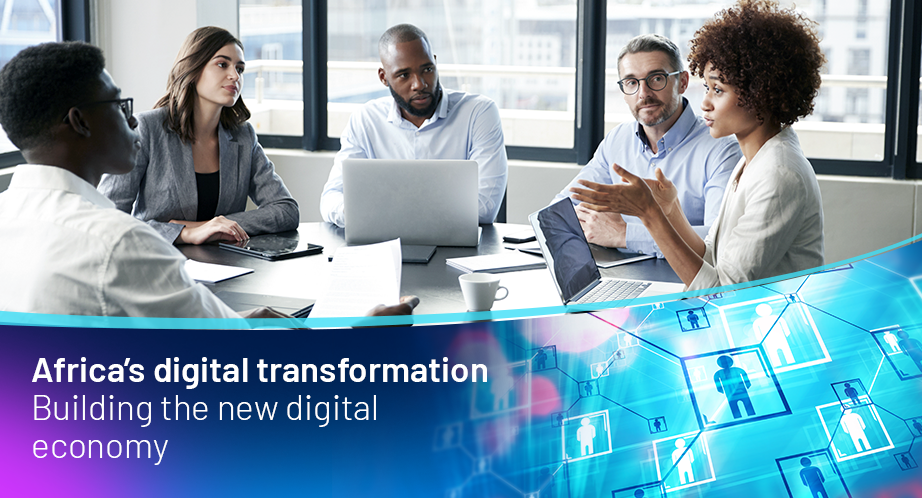Across the African continent, a profound digital transformation is taking shape. From broadband access and e-government platforms to the expansion of digital public infrastructure and the deployment of secure e-signing capabilities, African nations are rapidly advancing towards their digital futures. This shift is more than technological. It’s socio-economic, regulatory, and deeply human.
This blog takes a comprehensive look at how Africa is building a resilient and trusted digital economy and why secure e-signatures are becoming foundational to that progress.

The digital backbone – Infrastructure and access
Africa’s digital ambitions are being realised through major infrastructure investment, often supported by public-private partnerships and international cooperation. At the heart of this transformation is access. Specifically: access to the internet, mobile networks and affordable connectivity.
Internet access and mobile connectivity
Sub-Saharan Africa’s internet penetration has grown significantly from just 24% in 2015 to over 43% in 2023. This figure is expected to rise to 80% by 2030, driven by:
- The U.S.-Africa Digital Transformation with Africa (DTA) Initiative, which supports broadband deployment and affordable access.
- Google’s Equiano subsea cable, now active in West Africa, which has improved internet speeds and latency across the region
- The Made Alliance, a cooperative initiative aiming to connect 3 million rural Africans through digital farming tools.
With this growing connectivity, the foundation is being laid for a more advanced digital service, especially those that require real-time access, such as e-signing solutions and cloud-based identity verification.
Legal enablement – The rise of e-signature legislation
The legal recognition of digital transactions and e-signatures is a cornerstone of any secure digital ecosystem. African governments are increasingly aligning their legislation with international best practices, including:
- UNCITRAL’s Model Law on Electronic Commerce
- EU’s eIDAS Regulation
- Regional protocols such as those from the African Union and ECOWAS
These legislative efforts create a more secure and interoperable digital environment where trust services and e-signatures can thrive. Below are some standout examples from across the continent:
Country highlights:
- Kenya
Kenya has taken clear steps to foster advanced e-signature adoption. The Kenya Information and Communications Act and the Kenya Electronic Certification Service Provider Regulations establish a clear legal pathway for advanced electronic signatures (AES). Notably, the Kenya Revenue Authority already supports digitally signed e-filing. - Nigeria
The Nigerian Evidence Act legally recognises electronic records and signatures, and the National Information Technology Development Agency (NITDA) oversees trust services and digital certification authorities. - Senegal and Côte d’Ivoire
As members of the West African Economic and Monetary Union (WAEMU), both countries support harmonised digital signature laws and trust frameworks, including PKI-based solutions. - Togo
Togo is fast becoming a digital frontrunner in West Africa. The government has implemented laws governing digital identity, trust services, and personal data protection, allowing for scalable e-signature usage across government departments.
Digital identity and trust frameworks
A secure and interoperable digital identity is essential for meaningful e-signature strategy adoption. In recent years, Africa’s identity ecosystems have evolved rapidly, enabling seamless authentication for both individuals and organisations.
Leading initiatives
Several ambitious and collaborative efforts are driving this transformation:
- ID4Africa: A pan-African movement that supports foundational ID systems linked to legal identity, digital services, and national PKI frameworks. Over 40 African nations participate in this initiative, making it one of the continent’s most comprehensive identity efforts
- Ethiopia’s Fayda: A unique digital identity system rolled out under the Digital Ethiopia 2025 Strategy. Fayda integrates biometric and demographic data to streamline service access and prevent duplication.
- Tanzania, Uganda, and Ghana have integrated civil registration systems with national ID databases to reduce fraud and support e-government services.
- AU Digital ID Framework: The African Union is spearheading regional identity interoperability to support cross-border digital commerce and services.
These systems provide a critical trust layer that supports the legal validity and practical enforcement of digital signatures in the public and private sectors.
E-government services and e-signing adoption
Across the continent, nations are embracing e-signatures to modernise operations, reduce costs, and improve service delivery. The push toward digital government includes areas such as:
- Digital tax submissions
- eProcurement and contracting
- Business registration and licensing
- Secure communication between agencies
Country progress
- Rwanda has enabled digital signatures for land registries and tax services through Rwanda Revenue Authority and IremboGov portal.
- Namibia introduced the Electronic Transactions and Cybercrime Bill to support secure electronic transactions, including e-signature adoption across ministries.
- Mauritius has a fully operational Certifying Authority under the Information and Communication Technologies Authority (ICTA), enabling secure e-services.
- Botswana’s “SmartBots” strategy aims to digitise 500+ government services but faces challenges related to legacy systems and digital literacy, highlighting the importance of secure, user-friendly signing workflows.
In each case, e-signatures do more than digitise paperwork; they enable operational efficiency while safeguarding data integrity, non-repudiation, and trust in digital transactions.
Innovation, smart cities, and AI integration
Africa’s innovation ecosystem is rapidly expanding, creating demand for advanced digital trust services, including electronic signatures, PKI, and secure digital identities.
Tech-driven zones and smart cities
- Konza Technopolis (Kenya) is a model for a data-driven, paperless city with e-governance and smart infrastructure integrated from the ground up.
- GITEX Africa, the continent’s largest tech expo, showcases regional and global solutions for digital identity, signatures, AI, and cloud security, highlighting the growing demand for trusted services.
AI, blockchain, and voice-based tools
- Blockchain credentials: Morocco and Nigeria are exploring blockchain-secured academic records, where digital signatures ensure data integrity and authenticity.
- Voice-AI solutions like “Dukawalla” in Nairobi help small businesses access data and financial tools, providing that digital services must be inclusive and adaptable.
This expanding ecosystem creates new use cases for digital signatures across education, healthcare, finance, and logistics, demanding standards-based solutions that are scalable and interoperable.
The strategic role of e-signatures in Africa’s digital future
As African countries continue to scale their digital economies, the importance of electronic signatures becomes ever more strategic. Far from a simple convenience, they are critical infrastructure for the secure, compliant, and efficient delivery of digital services.
Why e-signatures matter
- Security and non-repudiation: They ensure that signed documents are tamper-proof and that signers are fully accountable.
- Operational efficiency: Automating workflows reduces manual processes, turnaround times, and eliminates human errors.
- Legal assurance: Advanced and qualified e-signatures meet global compliance requirements, from GDPR to UNCITRAL and eIDAS.
- Cross-border recognition: As regional trade zones (like AfCFTA) mature, harmonised e-signature frameworks are essential for business and diplomacy.
Looking ahead – Building the future of trusted digital services in Africa
Africa’s digital transformation is more than an aspiration. It is actively being designed, deployed, and scaled across borders.
As countries build stronger digital identities, expand infrastructure, and adopt international frameworks, the foundation for a robust and secure digital economy is taking shape.
But this is just the beginning.
The next phase will require sustainable, standards-based digital trust services. Tools that are not only secure and scalable, but also interoperable, legally compliant, and easy to integrate with public- and private-sector systems.
This is where Ascertia plays a vital role.
How Ascertia supports digital transformation in Africa
Ascertia provides the trust infrastructure necessary for governments, financial institutions and enterprises to:
- Implement legally compliant e-signatures, including Advanced and Qualified electronic signatures (AES/QES).
- Deploy national and enterprise-level PKI solutions, rooted in international standards such as X.509, ETSI, and eIDAS.
- Digitally transform public service delivery, including tax authorities, land registries, procurement platforms, and inter-ministerial workflows.
- Strengthen regulatory alignment and interoperability, ensuring cross-border recognition and audit-ready security.
Our solutions power secure digital identities, long-term signature validation (LTV), and automated digital workflows, all backed by high-assurance cryptography and global compliance. From government ministries to certifying authorities and national ID programs, we support organisations at every stage of their digital journey.
As Africa moves toward deeper regional integration, greater cross-border commerce, and smarter digital cities, the need for trusted digital signatures and infrastructure will only grow.
Ascertia is proud to stand alongside Africa’s digital leaders, helping nations and organisations to sign with confidence, foster digital trust, and unlock the full potential of the digital age.


